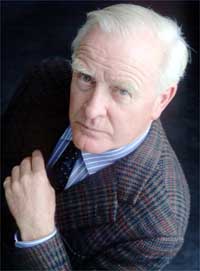Featured New Authors
Featured Author: John le Carré

Featured Author: John le Carré
With News and Reviews From the Archives of The New York Times
In This Feature
Related Links
 Wyatt Counts/ The Associated Press |
| John le Carré |
(1964)
“. . . should establish him firmly beside Ambler and Greene in the small rank of writers who can create a novel of significance, while losing none of the excitement of the tale of sheer adventure.”
(1964)
“Le Carré’s spy stories are much better than the best spy stories by others.”
(1965)
“. . . a story with some of the suspense of a spy thriller and also with some of the psychological, social density of a novel. But the two modes do not mingle well . . .”
(1968)
“. . . an exciting, compulsively readable and brilliantly plotted novel. Le Carré has shown once more that he can write this kind of book better than anyone else around — and he has done so without repeating himself.”
(1974)
“. . . a thoroughly enjoyable English spy novel about the discovery of a double agent at the highest level of the British Intelligence bureaucracy. It reconfirms the impression that Le Carré belongs to [a select company
of] spy and detective story writers . . .”
(1977)
“‘The Honourable Schoolboy’ is a remarkable sequel to ‘Tinker, Tailor, Soldier, Spy.’ . . . John le Carré seems to have gotten tired of being compared to Graham Greene, and decided instead to be
Joseph Conrad.”
(1980)
“The writing of ‘Smiley’s People’ is a little tired, and the whole book a little bland. It is as if le Carre had crossed this ground once too often. But it is his ground . . .”
(1983)
“Mr. le Carré’s novel is certainly the most mature, inventive and powerful book about terrorists-come-to-life this reader has experienced. . . . This book will permanently raise him out of the espionage league,
narrowly viewed.”
(1986)
“. . . a first-rate espionage novel, perhaps the best of his already impressive oeuvre. . . . He works with a thoroughness that inevitably brings to mind the 19th century.”
(1989)
“. . . an exciting spy story, which is at the same time a lively international comedy of manners. . . . The book is also a well-informed, up-to-the-minute political parable, incisive and instructive. In short, vintage le
Carré . . .”
(1991)
“. . . an intriguing amalgam of meditation, fictive autobiography and numerous spy stories. . . . technically, Mr. le Carré’s most magisterial accomplishment. . . . it is at moments like this that we catch strong
echoes of its literary precursors — Joseph Conrad, John Buchan and P. C. Wren.”
(1993)
“. . . a brilliant performance, executed with an exuberance, a richness of detail and a narrative drive that have been absent from Mr. le Carré’s writing for a decade.”
(1995)
“As an adventure novel in the British tradition of John Buchan and Eric Ambler, ‘Our Game’ is moderately successful. But Mr. le Carré has also tried to endow the book with psychological subtlety and political
relevance. . . . Yet these larger ambitions seem ineffectual.”
(1996)
“Readers who were wondering what life in the afterleft might be like for writers like John le Carré now have their answer. What he has done is to venture fiercely into satire, producing a tour de force in which almost
every convention of the classic spy novel is violated.”
(September 25, 1977)
in this interview, le Carré talks about the similarities between being an author and being a spy.
(August 29, 1982)
On the occasion of the publication of “The Quest for Karla,” Anatole Broyard reflects on le Carré’s “baroque conception of international politics.”
(March 13, 1983)
“From early on, I was extremely secretive,” le Carré says in this interview, conducted at his hideaway estate on the cliffs of Cornwall, “and began to think that I was, so to speak, born into occupied
territory.”
(July 6, 1983)
Some Israeli commentators charged that le Carré’s “The Little Drummer Girl” was “anti-Israeli.”
(March 16, 1986)
In this article for The New York Times Magazine, Joseph Lelyveld talked to le Carré about “A Perfect Spy” and its fictionalized portrait of le Carré’s father.
(May 22, 1989)
“I always wrote about people groaning under the moral weight of the cold war and begging to get out,” le Carré told The New York Times at a time when glasnost was changing both his audience and his subject
matter. “I’m absolutely delighted to be presented with a new pack of cards.”
(September 29, 1989)
In this excerpt from a speech, le Carré urges America to accept the end of the cold war rivalry.
(July 8, 1993)
“If you give a tyrant a secret police, he’ll find people to torture,” says le Carré in this interview about “The Night Manager.” “There is always the unspoken argument that this is
natural selection, and since people are always going to have wars, they might as well have them with our weapons.”
(February 19, 1995)
Le Carré writes about the characters he met on his first trip to Russia since the end of the cold war.
Source link



